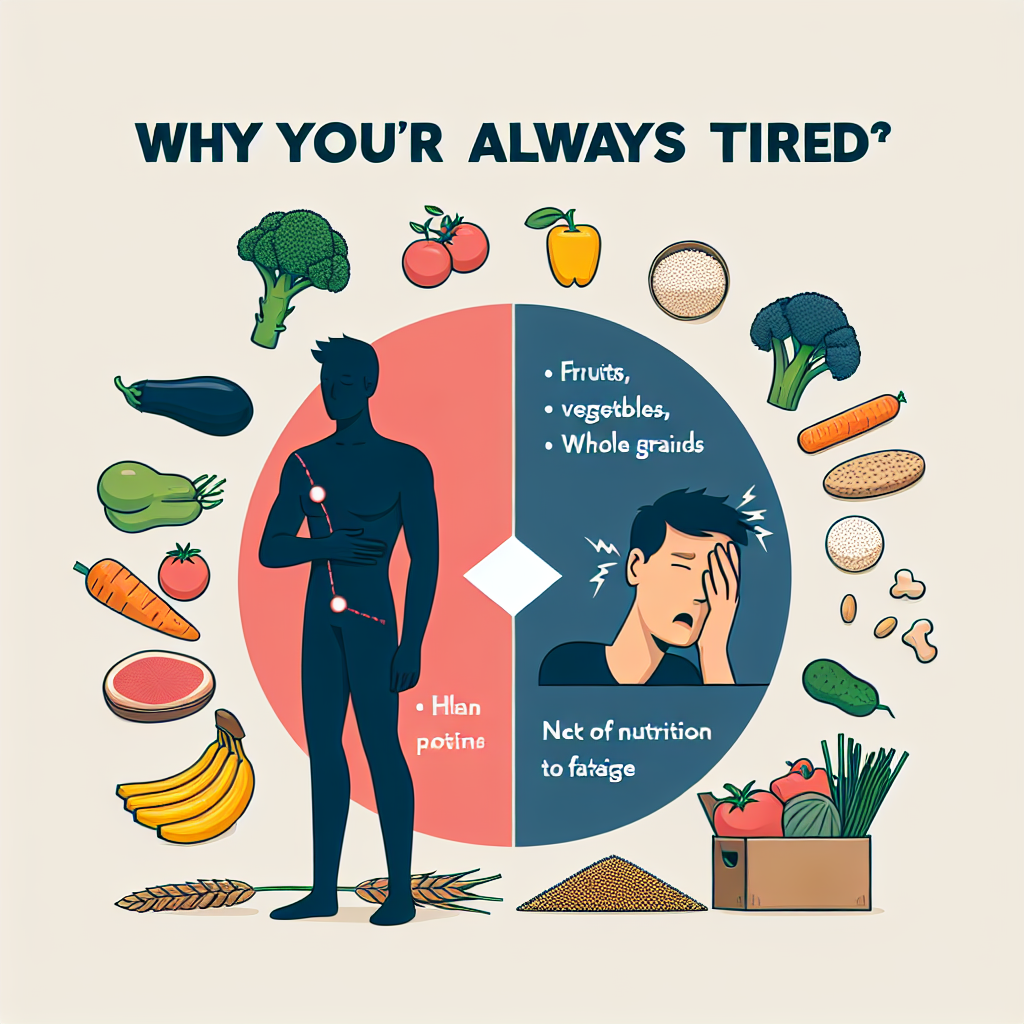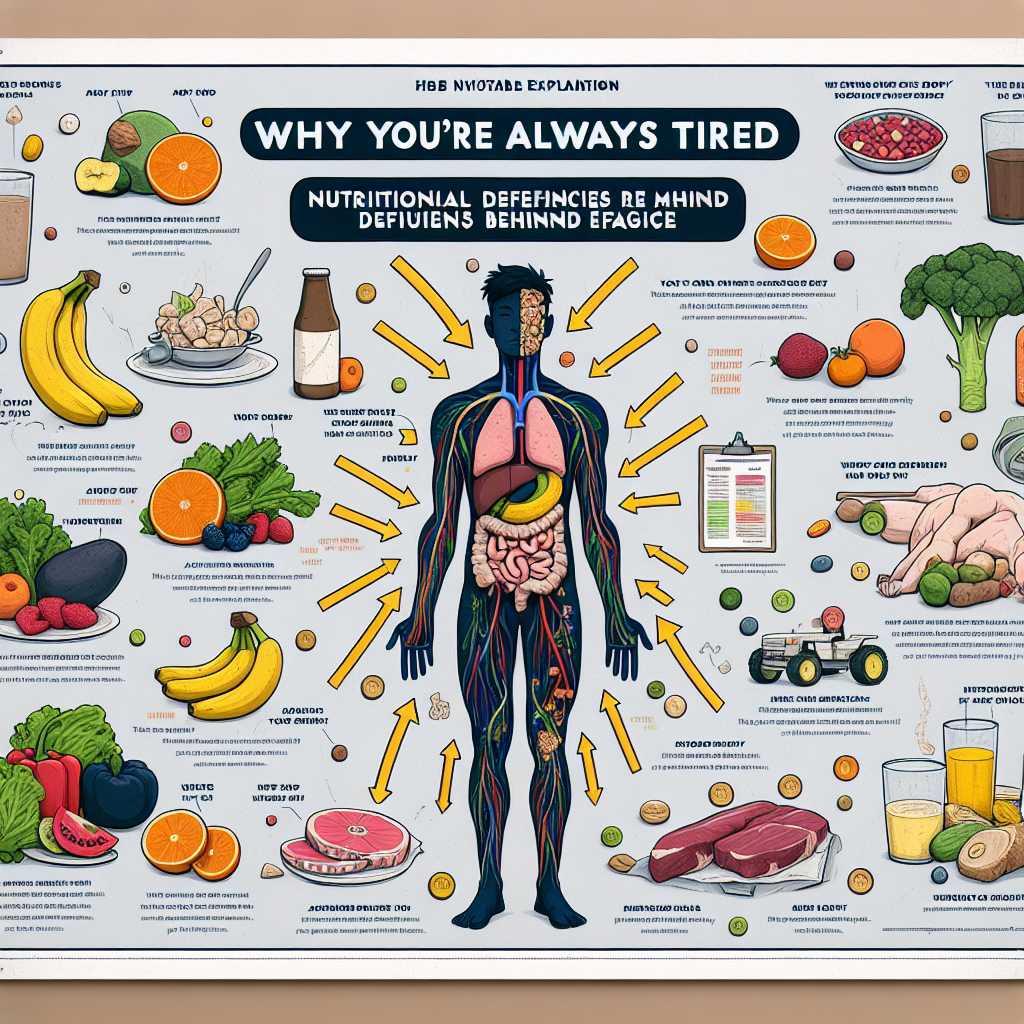Why You’re Always Tired: Nutritional Deficiencies Behind Fatigue

Discover the nutritional deficiencies behind your constant fatigue. Learn how to combat tiredness with the right diet and supplements. Don’t let fatigue control your life. Visit My Vibrant Vitality now to start your journey towards a more energetic and vibrant life.
Exploring the Link Between Nutritional Deficiencies and Constant Fatigue
If you find yourself constantly battling fatigue, it may be time to consider the possibility that your diet could be the culprit. The link between nutritional deficiencies and constant fatigue is a topic that has been gaining increasing attention in the health and wellness community. It’s a connection that is often overlooked, but one that can have a profound impact on your energy levels and overall well-being.
The human body is a complex machine that requires a wide range of nutrients to function optimally. When we fail to provide our bodies with the necessary fuel, it’s akin to trying to run a car on an empty tank. The result is often a pervasive sense of tiredness that can be hard to shake.
One of the most common nutritional deficiencies linked to fatigue is iron deficiency. Iron is a crucial component of hemoglobin, the protein in red blood cells that carries oxygen from the lungs to the rest of the body. When iron levels are low, the body struggles to produce enough healthy red blood cells, leading to a condition known as anemia. Symptoms of anemia include fatigue, weakness, and shortness of breath.
Another nutrient that plays a vital role in energy production is vitamin B12. This vitamin is necessary for the production of red blood cells and for the proper functioning of the nervous system. A deficiency in vitamin B12 can lead to a type of anemia called pernicious anemia, which is characterized by fatigue, weakness, and cognitive difficulties.
Magnesium is another nutrient that is often overlooked when it comes to energy production. This mineral is involved in over 300 biochemical reactions in the body, many of which are related to energy production. A deficiency in magnesium can lead to symptoms such as fatigue, muscle weakness, and loss of appetite.
In addition to these, deficiencies in other nutrients such as vitamin D, iodine, and omega-3 fatty acids can also contribute to feelings of constant fatigue. Vitamin D is essential for bone health and immune function, while iodine is necessary for the production of thyroid hormones, which regulate metabolism and energy levels. Omega-3 fatty acids, on the other hand, are essential for brain health and can help to combat inflammation, which is often linked to fatigue.
It’s important to note that while nutritional deficiencies can certainly contribute to fatigue, they are not the only potential cause. Other factors such as stress, lack of sleep, and certain medical conditions can also lead to feelings of constant tiredness. Therefore, if you’re struggling with fatigue, it’s important to speak with a healthcare provider to determine the underlying cause.
In conclusion, the link between nutritional deficiencies and constant fatigue is a significant one. By ensuring that we are providing our bodies with the necessary nutrients, we can help to combat fatigue and boost our energy levels. Whether it’s through a balanced diet, supplementation, or a combination of both, addressing nutritional deficiencies can be a powerful tool in the fight against fatigue.
Understanding Why You’re Always Tired: The Role of Nutrition

If you find yourself constantly battling fatigue, it may be time to consider the role of nutrition in your overall energy levels. Many people are surprised to learn that their diet can significantly impact their feelings of tiredness or energy throughout the day. In fact, nutritional deficiencies are often at the root of chronic fatigue.
To begin with, it’s important to understand that our bodies require a wide range of nutrients to function optimally. These include macronutrients like proteins, fats, and carbohydrates, as well as micronutrients such as vitamins and minerals. When we don’t get enough of these essential nutrients, our bodies can’t produce the energy they need, leading to feelings of constant tiredness.
One of the most common nutritional deficiencies linked to fatigue is iron deficiency. Iron is a crucial component of hemoglobin, the protein in red blood cells that carries oxygen from the lungs to the rest of the body. Without enough iron, your body can’t produce enough healthy red blood cells, leading to a condition known as anemia. Symptoms of anemia include fatigue, weakness, and shortness of breath.
Another key nutrient that plays a significant role in energy production is vitamin B12. This vitamin is necessary for the formation of red blood cells and the maintenance of the nervous system. A deficiency in vitamin B12 can lead to a specific type of anemia called pernicious anemia, which is characterized by fatigue, weakness, and cognitive difficulties.
Magnesium is another nutrient that is often overlooked when it comes to energy production. This mineral is involved in over 300 biochemical reactions in the body, many of which are related to energy production. A deficiency in magnesium can lead to symptoms such as fatigue, muscle weakness, and loss of appetite.
In addition to these specific nutrients, a general lack of calories can also lead to feelings of fatigue. Our bodies need a certain amount of energy each day to carry out basic functions like breathing, circulating blood, and regulating body temperature. If you’re not consuming enough calories, your body may not have enough energy to perform these functions, leading to feelings of tiredness.
It’s also worth noting that the quality of the calories you consume matters just as much as the quantity. Consuming a diet high in processed foods and sugars can lead to spikes and crashes in blood sugar levels, which can leave you feeling tired and sluggish. On the other hand, a diet rich in whole foods like fruits, vegetables, lean proteins, and whole grains can provide a steady source of energy throughout the day.
In conclusion, if you’re always feeling tired, it may be worth taking a closer look at your diet. Nutritional deficiencies in iron, vitamin B12, and magnesium, as well as a general lack of calories, can all contribute to feelings of fatigue. By ensuring that you’re consuming a balanced diet rich in these essential nutrients, you can help to boost your energy levels and combat fatigue. Remember, it’s always a good idea to consult with a healthcare professional before making any major changes to your diet or supplement routine.
The Impact of Nutritional Deficiencies on Chronic Fatigue: A Comprehensive Guide
If you’re constantly feeling tired, it’s not just the lack of sleep that could be the culprit. Your diet plays a significant role in how you feel throughout the day. Nutritional deficiencies can lead to chronic fatigue, a condition that affects millions of people worldwide. This article will delve into the impact of nutritional deficiencies on chronic fatigue, providing a comprehensive guide to understanding this complex issue.
Firstly, it’s important to understand what chronic fatigue is. It’s a state of constant tiredness or exhaustion that doesn’t improve with rest and can’t be explained by an underlying medical condition. It can significantly impair your daily activities, making it difficult to function at work or home. Chronic fatigue can be a symptom of various health conditions, but it can also be a sign of nutritional deficiencies.
One of the most common nutritional deficiencies linked to chronic fatigue is iron deficiency. Iron is a crucial mineral that our bodies need to produce hemoglobin, a protein in red blood cells that carries oxygen from the lungs to the rest of the body. When you’re iron-deficient, your body can’t produce enough hemoglobin, leading to a condition called anemia. This can result in chronic fatigue, as your body isn’t getting the oxygen it needs to function properly.
Similarly, deficiencies in vitamins B12 and D can also lead to chronic fatigue. Vitamin B12 is essential for nerve function and the production of red blood cells and DNA. A deficiency in this vitamin can lead to anemia, similar to iron deficiency, causing fatigue. On the other hand, vitamin D plays a crucial role in bone health, immune function, and mood regulation. A deficiency in vitamin D can lead to fatigue, depression, and weakened immune function.
Magnesium is another nutrient that’s often overlooked but plays a vital role in energy production. It’s involved in hundreds of biochemical reactions in your body, including converting food into energy. A deficiency in magnesium can lead to fatigue, muscle weakness, and loss of appetite.
Lastly, dehydration can also lead to feelings of fatigue. Water is essential for virtually every function in our body, including energy production. Even mild dehydration can cause a significant drop in energy levels.
In conclusion, chronic fatigue can be a debilitating condition that significantly impacts your quality of life. While there are many potential causes, nutritional deficiencies are a common and often overlooked factor. If you’re constantly feeling tired, it may be worth considering whether a lack of essential nutrients like iron, vitamins B12 and D, magnesium, or even water could be the cause.
Remember, it’s always best to consult with a healthcare professional before making any significant changes to your diet or supplement routine. They can provide personalized advice based on your specific needs and conditions. By addressing nutritional deficiencies, you can take a significant step towards overcoming chronic fatigue and improving your overall health and wellbeing.